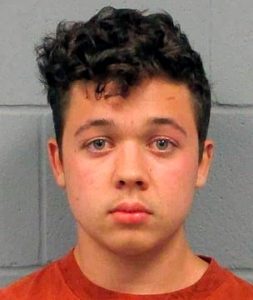 Teenaged vigilante Kyle Rittenhouse, 17 (mugshot, left), who is awaiting trial for shooting three people in Kenosha, Wisconsin, told the Washington Post he bought the gun “with money from a government stimulus check, using a friend to make the purchase because he is too young to buy a firearm.”
Teenaged vigilante Kyle Rittenhouse, 17 (mugshot, left), who is awaiting trial for shooting three people in Kenosha, Wisconsin, told the Washington Post he bought the gun “with money from a government stimulus check, using a friend to make the purchase because he is too young to buy a firearm.”
The friend, Dominic Black, 18, faces felony charges for illegally supplying a gun to a minor. Meanwhile, Rittenhouse’s mother still “sees nothing wrong with teenagers” possessing guns, even though her son now has blood on his hands and potentially faces years in prison. She blames the police and Wisconsin’s Democratic governor, not the vigilantes, for the Kenosha vigilantism.
Rittenhouse told the Post, “Ever since I was little, I couldn’t decide if I wanted to be a police officer, or a firefighter, or a paramedic.” It’s now unlikely he’ll ever be any of those things.
Rittenhouse has claimed he shot the three people, two of whom died, in self-defense; and that’s the claim his lawyers have made in the media, and will make in the courts. But all three of the people he shot were only trying to disarm him, and the two people he killed were unarmed. Under Wisconsin law, that makes his self-defense claim a longshot. A sympathetic jury might acquit him — juries can do weird things — but the facts of the case and applicable law suggest he could be facing many years in prison.
In view of his youth, however, even if convicted he may not be sentenced to life. The U.S. Supreme Court has imposed limits on the length of sentences that can be imposed on juvenile offenders tried as adults, on the grounds they’re less than fully culpable because they’re immature. (And it won’t be hard to establish immaturity and childish exercise of judgment in Rittenhouse’s case.) And Rittenhouse likely would serve any sentences for the three shootings concurrently.
Read story here.